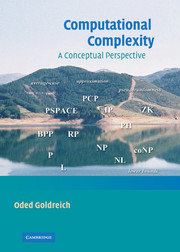Book contents
- Frontmatter
- Contents
- List of Figures
- Preface
- Organization and Chapter Summaries
- Acknowledgments
- 1 Introduction and Preliminaries
- 2 P, NP, and NP-Completeness
- 3 Variations on P and NP
- 4 More Resources, More Power?
- 5 Space Complexity
- 6 Randomness and Counting
- 7 The Bright Side of Hardness
- 8 Pseudorandom Generators
- 9 Probabilistic Proof Systems
- 10 Relaxing the Requirements
- Epilogue
- Appendix A Glossary of Complexity Classes
- Appendix B On the Quest for Lower Bounds
- Appendix C On the Foundations of Modern Cryptography
- Appendix D Probabilistic Preliminaries and Advanced Topics in Randomization
- Appendix E Explicit Constructions
- Appendix F Some Omitted Proofs
- Appendix G Some Computational Problems
- Bibliography
- Index
Appendix C - On the Foundations of Modern Cryptography
Published online by Cambridge University Press: 05 June 2012
- Frontmatter
- Contents
- List of Figures
- Preface
- Organization and Chapter Summaries
- Acknowledgments
- 1 Introduction and Preliminaries
- 2 P, NP, and NP-Completeness
- 3 Variations on P and NP
- 4 More Resources, More Power?
- 5 Space Complexity
- 6 Randomness and Counting
- 7 The Bright Side of Hardness
- 8 Pseudorandom Generators
- 9 Probabilistic Proof Systems
- 10 Relaxing the Requirements
- Epilogue
- Appendix A Glossary of Complexity Classes
- Appendix B On the Quest for Lower Bounds
- Appendix C On the Foundations of Modern Cryptography
- Appendix D Probabilistic Preliminaries and Advanced Topics in Randomization
- Appendix E Explicit Constructions
- Appendix F Some Omitted Proofs
- Appendix G Some Computational Problems
- Bibliography
- Index
Summary
It is possible to build a cabin with no foundations, but not a lasting building.
Eng. Isidor Goldreich (1906–95)Summary: Cryptography is concerned with the construction of computing systems that withstand any abuse: Such a system is constructed so as to maintain a desired functionality, even under malicious attempts aimed at making it deviate from this functionality.
This appendix is aimed at presenting the foundations of cryptography, which are the paradigms, approaches, and techniques used to conceptualize, define, and provide solutions to natural security concerns. It presents some of these conceptual tools as well as some of the fundamental results obtained using them. The emphasis is on the clarification of fundamental concepts, and on demonstrating the feasibility of solving several central cryptographic problems. The presentation assumes basic knowledge of algorithms, probability theory, and complexity theory, but nothing beyond this.
The appendix augments the treatment of one-way functions, pseudorandom generators, and zero-knowledge proofs, given in Sections 7.1, 8.2, and 9.2, respectively. Using these basic primitives, the appendix provides a treatment of basic cryptographic applications such as encryption, signatures, and general cryptographic protocols.
Introduction and Preliminaries
The rigorous treatment and vast expansion of cryptography is one of the major achievements of theoretical computer science. In particular, classical notions such as secure encryption and unforgeable signatures were placed on sound grounds, and new (unexpected) directions and connections were uncovered.
- Type
- Chapter
- Information
- Computational ComplexityA Conceptual Perspective, pp. 482 - 522Publisher: Cambridge University PressPrint publication year: 2008
- 1
- Cited by



